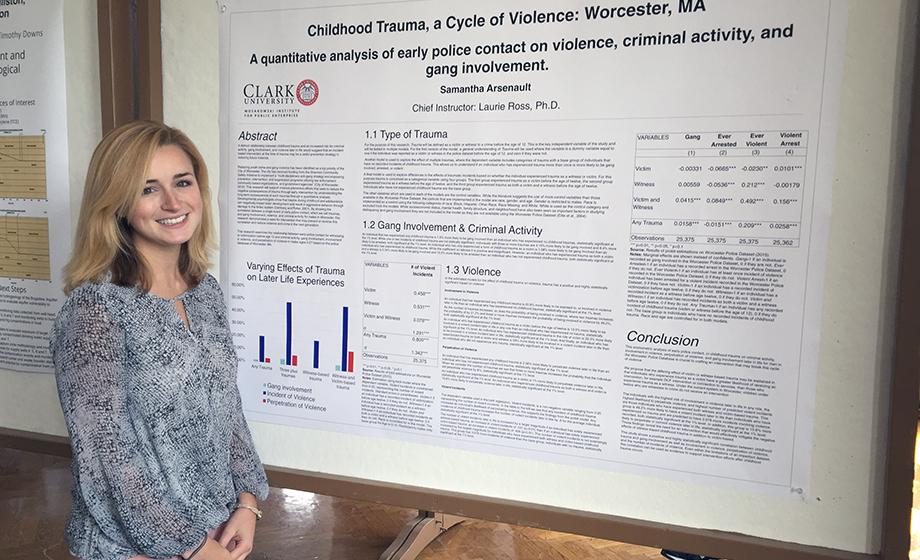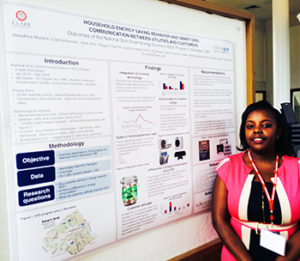
Just months after graduating from Clark, Samantha Arsenault ’15 found a way to put her economics degree to good use. She conducted research with Associate Professor Laurie Ross to examine a daunting community problem: whether boys who witness or are victims of crimes in childhood may later be drawn to violence, criminal activity and gangs.
“I was able to take what I learned as an undergraduate – quantitative analysis and data sets – and put it to use in another field,” said Arsenault (pictured above), who is pursuing a master’s degree in community development and planning and working as a graduate research assistant for Clark’s Mosakowski Institute for Public Enterprise. “That’s the goal of the Mosakowski Institute: to get research into practice, and that’s what I’ve tried to adopt in my own work.”
Arsenault’s interdisciplinary presentation was one of nearly 70 research projects on display at the 14thannual Graduate Student Multidisciplinary Conference at Clark on April 6. The Graduate Student Council organized the eight-hour event, which featured a luncheon, oral and poster presentations and a reception and awards ceremony in Higgins University Center.

In remarks before the lunchtime crowd, President David P. Angel said the conference offers a “taste of the diversity of scholarship” in Clark’s nine doctoral programs and 17 master’s degrees, representing a “significant accomplishment and a point of pride for the University,” he said. In reviewing the students’ abstracts, Angel noted, he found not the “isolating experience” sometimes described by researchers but instead a sense of joy, passion and “hope that your work brings when you take on some of the challenges of our society.”
Graduate students at Clark have the opportunity to work across disciplines, Angel continued, and to build “a community of shared interests, a community that is extended beyond our own campus doors to the communities of which you are a part.”
In the afternoon poster and oral presentations, graduate students showcased and discussed a range of scholarship, much of which extends out into the broader community and world.
For instance, Arsenault’s quantitative analysis of data from the Worcester police could be used by Clark’s community partners to find ways to intervene earlier in the lives of boys who both experience and witness trauma, a way to “break the cycle of violence,” she explains.
For Arsenault, there’s an added bonus to her research: As part of her tuition-free accelerated master’s degree – a special fifth-year program offered to qualified undergraduate students at Clark – she’s gaining the experience she’ll need when applying for jobs this spring. She graduates in May.
Other examples of graduate research at the conference:
- Josephine Munene, a Kenyan who is pursuing dual master’s degrees in environmental science and policy and business management, analyzed whether National Grid customers were embracing energy conservation as the result of a pilot smart grid project. Munene applied to Clark because its small size would allow her to interact more closely with faculty, something she was not always able to do as an undergraduate in environmental science at a larger university in Kenya. Her research was conducted as part of her internship at the Clark-National Grid Sustainability Hub. Her faculty advisers are Gregory Trencher, visiting assistant professor of environmental science and policy, and Jing Zhang, associate professor of management.
- William Thoman, a second-year master’s student in geographic information systems (GIS) for development and environment, presented preliminary analysis of satellite data showing the displacement of minority groups by the Islamic State in Syria and Iraq – and the impact on agricultural land. For two years, Thoman worked with refugees through resettlement programs in Tucson, Ariz., an experience that piqued his interest in using a new tool set, Google Earth Engine, to better understand the humanitarian impact of ongoing warfare in the Middle East. Thomas’ adviser is John Rogan, associate professor of geography.
- Erin Glennie, a fifth-year master’s student in geography working with Professor J. Ronald Eastman, used satellite data to study the effects of El Niño on vegetation, taking into account precipitation and temperature data. In the El Niño effect, occurring every so often around December and January, warmer water in the western Pacific shifts east, affecting weather patterns across the world.
- Mochamad Pasha, a graduate student in economics working with Assistant Professor Marc Rockmore, investigated the relationship between poor sanitation practices and stunted growth among children in Indonesia. “Stunting,” as it is called in international studies, “is a public health concern with long-term ramifications” for both human and economic development, he pointed out, and “sanitation is a crucial component in averting stunting.”
Additional presentations included research from graduate students in a number of other disciplines, including biology, chemistry, English, history, information technology, physics, psychology and more.
